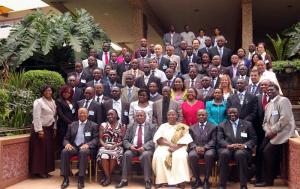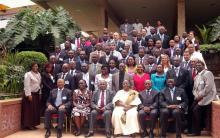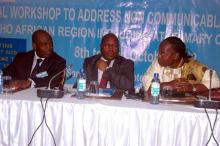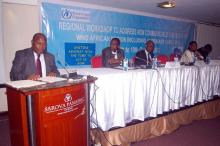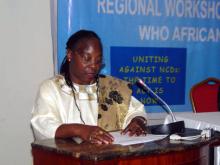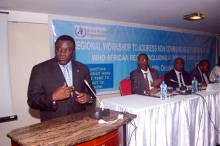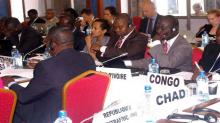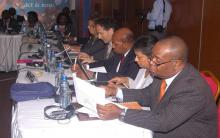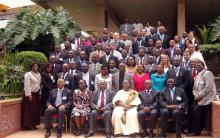“UNITING AGAINST NCDs” - Regional Workshop to address Non-Communicable Diseases kicks off in Nairobi
08 October 2012, Nairobi -- The Regional workshop to address Non-Communicable Diseases in the WHO African Region was officially opened today in Nairobi by the Honourable Minister of Medical Services, Hon. Anyang’ Nyong’o.
The meeting whose theme is “Uniting against NCDs: The time to act is now”, will take stock of the implementation of the existent 2008-2013 Global Action Plan for the Prevention and Control of NCDs, while developing a framework for acceleration of the implementation of the different commitments on NCDs prevention and control as AFRO’s contribution to the global framework.
The three days (8 to 10 October) meeting graced by among other high level dignitaries the WHO Kenya Country Representative, Dr Custodia Mandlhate; the WHO-AFRO Director for the Disease Prevention and Control Cluster, Dr Jean-Baptiste Roungou; the President of the International Diabetes Federation (IDF), Prof. Jean-Claude Mbanya brought together participants from the 46 countries in the African Region represented by Directors and NCD focal persons from the ministries of health. Also present were participants from the four WHO levels (HQ, AFRO, Inter-Country Support teams and Kenya Country Office), global, regional and national partners representing various institutes including research and academic institutions, civil society members and members of the media.
In his official address, delivered by the Director of Medical Services Dr Francis Kimani, the Hon. Minister of Medical Services, Hon. Anyang Nyong’o, officially opened the regional workshop and welcomed all the participants to Kenya. The Minister went on to underscore the existing double burden of both communicable and non-communicable diseases in the region. He highlighted the increasing burden of NCDs in Kenya where over 50% of all hospital admissions and 55% of hospital deaths are caused by NCDs. This can be attributed to the increasing health risky behaviours, including tobacco use, harmful use of alcohol, unhealthy diets, physical inactivity and exposure to environmental carcinogens in the population.
The Minister advised on the need of tackling holistically tackling NCDs and urged the African countries to invest more in NCDs prevention, control and management. The Minister went further to highlight the key strategies to reduce health risk factors and encourage healthy choices. These were among others: multi-sectoral actions, including the establishment of results-oriented collaborative efforts, alliances and partnerships; programmes related to advocacy, community mobilization and environmental interventions; re-orientation of health systems; legislative, administrative and political commitments that promote healthy public policies; and addressing the underlying determinants of NCDs using inter-sectoral actions.
In her remarks, the WHO Country Representative, Dr Custodia Mandlhate took the opportunity to welcome the participants to the country and to the meeting and wished them well during their stay. The WR also thanked the Kenya Government for their acceptance to host the regional meeting.
Dr Custodia briefly gave an overall scenario of NCDs in the region, highlighting the magnitude of the problem and the future projections in the region. The Region has the highest age-standardized NCDs mortality rates for all ages - for males (844 per 100 000) and for females (724 per 100 000). In 2010, NCDs were responsible for more than 3 million deaths representing 40% of all deaths in the WHO African region. About half of all deaths due to NCDs occur in persons aged less than 70 years, making NCDs a significant contributor to premature death and disability in Africa. NCDs are projected to exceed communicable diseases, maternal, perinatal, and nutritional diseases as the most common causes of death in Africa by 2025.
The WR, mentioned and commended recent global and regional political commitments pledged in the fight against NCDs. These include the United Nations High-level Summit of Heads of State and Government on Non-Communicable Diseases (NCDs) in New York that took place in September 2011 and the First Global Ministerial Conference on NCDs and Healthy Lifestyles jointly organized by the Russian Federation and the World Health Organization in Moscow in April 2011, the Regional Ministerial Consultation on NCDs held from 04 to 06 April 2011 in Brazzaville, Congo and the subsequent adopted Brazzaville Declaration, which is proposed for full endorsement in this year’s 62 Regional Committee later this month in Luanda, Angola.
Dr Custodia reiterated WHO’s strong commitment in providing technical support to Member States, in collaboration with other partners in accelerating and improving the key interventions for addressing NCDs prevention and control at all levels including the primary health care level. She finally wished all participants well and successful deliberations in the meeting.
Others who spoke at the meeting included the President of the International Diabetes Foundation (IDF), Prof. Mbanya, who urged all participants to seize the opportunity to address the NCD challenges facing the African continent. He thanked and commended WHO for organizing the meeting and bringing together regional experts to take stock of the NCD situation in the region and contribute to the global action plan.
The opening session ended up with a press conference with key note speakers addressing and answering questions from media houses present at the meeting.
“UNITING AGAINST NCDs” - Regional Workshop to address Non-Communicable Diseases kicks off in Nairobi
For further information, please contact:
World Health Organization, Kenya 4th floor ACK Garden House.
1st Ngong Avenue off Bishop Rd.
P.O. BOX 45335, 00100 (GPO)
Nairobi, Kenya.
Email :wrkenya [at] ke.afro.who.int



